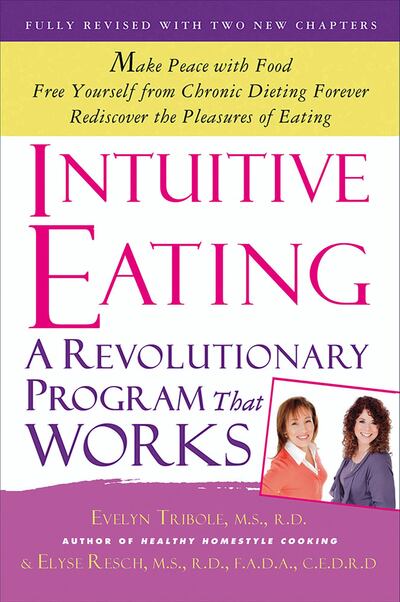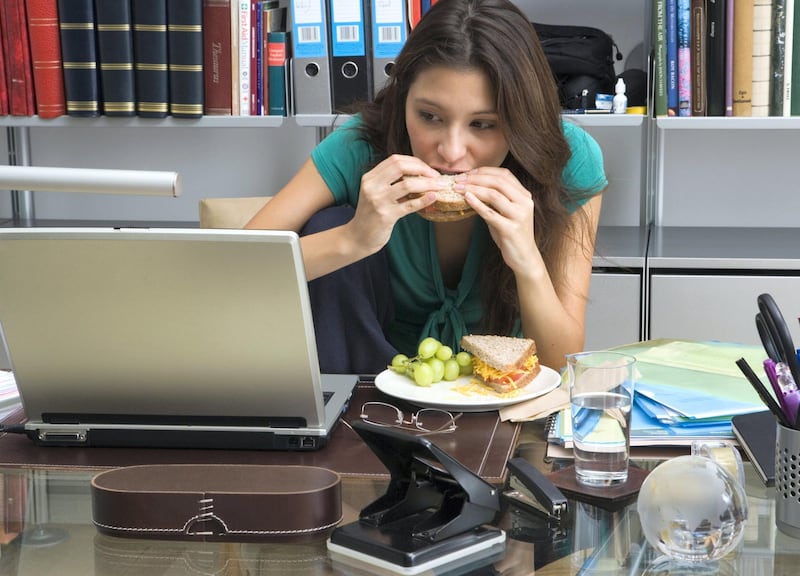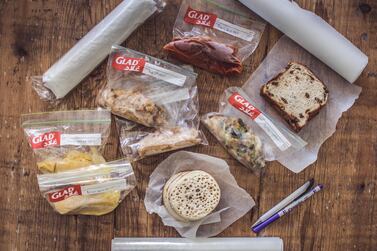"The only time to eat diet food is while you're waiting for the steak to cook." So said American chef and culinary genius Julia Child. It seems that now, more than ever, we seem to be following her sage advice. So here's a food trend you might be able to get down with for 2019: abandoning tired diet rhetoric and fad regimes in favour of a way of eating that actually suits you and your body specifically; and eating when you're hungry and only until you're full. It's what UK food consultancy firm Harris & Hayes calls "intuitive eating" – the diet (if any) to follow if you're "woke" to your body's true needs.
Instead of restricting or eliminating food groups, the intuitive-eating brigade touts a completely balanced diet with less of a focus on what it is you're consuming. The focus instead is on how you eat it and how long for. Put simply by Lisa Harris of Harris & Hayes, intuitive eating is "an age-old primal sense of knowing when we've had enough". It sounds like common sense, but our modern, hectic lives often leave us out of touch with how we consume food. Wolfing down a salad at your desk, or ploughing through three, four or five slices of pizza while watching a movie, without even thinking – forget chewing – may well be second nature to many.
The concept sounds simple enough, but putting intuitive eating into practice may be more difficult than you think. Elyse Resch and Evelyn Tribole, authors of Intuitive Eating: A Revolutionary Program that Works have just about every aspect of how to eat intuitively covered.

It isn’t just about eating when you’re hungry; the duo also encourage those opting to take the more natural approach to losing weight to “reject the diet mentality” and “throw out the diet books”. As well as honouring your hunger, to be an intuitive eater you must be able to “give yourself unconditional permission to eat” and fight the thought that you’re doing something “bad” if you indulge in a piece of chocolate cake every now and then.
At the same time, it isn't only about eating whatever you fancy. The duo also eulogise the importance of "respecting your fullness" and really focusing on how the body feels when you exercise. Instead of pushing yourself into punishing exercise regimes that you dread, the authors say that the intuitive way to exercise is to take genuine pleasure in moving your body and tuning into your breath when hitting the gym, running track or yoga mat.
Need of the hour
Harris and Hayes say the interest in intuitive eating has risen considerably over the past five years. This may be due to the overarching cultural movement of self-care and the self-care industry, which includes body positivity, mindfulness and a more personalised approach to nutrition.
The idea behind intuitive eating is doing things completely as nature intended. "Brands have caught on to this, and they're now making natural health claims a key part of their marketing strategy," says Harris. According to the Mintel Global New Products Database, natural product claims appeared on 29 per cent of global food and drink launches from September 2016 to August 2017 – a 17 per cent increase from 2006-2007. Further, Allied Market Research predicts that the global natural food and drinks market is estimated to reach $192 million (Dh705.1m) by 2023, an increase of nearly 14 per cent from 2017. With the majority of fad diets known to fail and lead to subsequent weight gain, it's about time we found a method for weight loss that actually works, and intuitive eating – the trend that calls on us to ditch dieting altogether – looks like it's going to be one that sticks.
How to eat intuitively
So how can you embark on a plan? "A healthy body does not begin in the gym or in the kitchen, it begins in the mind," says Dubai nutritionist Fran Ellis of Frantastic Life. Focusing her programme solely on intuitive eating, Ellis has made a career of steering clients away from unsuccessful "diets" in favour of a more fluid approach to healthy eating.
“We’ve lost touch with our body’s natural cues. People come to me and they don’t remember what it feels like to be hungry,” says Ellis, listing the reasons we might choose to eat without feeling those all-important hunger pangs, which is a basic requirement if you’re switching to eating the intuitive way.

Emotion-driven eating is one of the biggest things that can trip us up when beginning to think about how we eat. Other factors include time restrictions and a hectic lifestyle that might limit and define when we are actually able to eat. If your lunch break at the office is always between 1pm and 2pm, but you don't really get hungry until 3pm, then you're not eating intuitively. Similarly, if you're reaching for a chocolate bar because of some personal turmoil, a break-up, say, or because you recently quit smoking, that too is not intuitive eating.
Ellis has a number of tricks to get her clients consuming intuitively. The first is slowing down the eating process, with a focus on chewing food slowly so that you're able to recognise when you are full. Next is an absolute stripping away of distractions when you're eating. On-the-go meals are a no-no. Instead, Ellis advises her clients to sit at a table, turn off the TV or ditch the magazine, phone or tablet, in favour of just you and a dish put in front of you. "Just by eating slowly and mindfully, I see people start to reduce portion sizes, they digest better, they make healthier food choices and they feel less stressed in general – not just when they're eating," explains Ellis.
You can also wave goodbye to those post-lunch naps if you’re going down the intuitive-eating path. “Always eat until you are just satisfied. After a meal, you should feel energised enough to go for a brisk walk,” says Ellis. She also advises thinking about hunger on a scale of one to 10. Until you’re at a seven on the hunger scale, don’t reach for that sandwich.
Finally, Ellis advises steering well clear of processed foods. "The processed food industry does not help with intuitive eating at all – manufacturers know which buttons to press and spend billions engineering calorie-rich foods that hit as many pleasure senses as possible in the fastest time," she says. With intuitive eating, you can have your cake and eat it, too. Only bake it yourself first and then take your time chewing on it.







